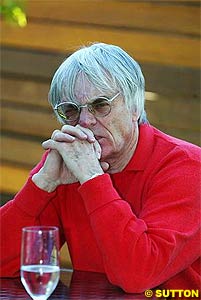Atlas F1 Magazine Writer
Fresh from the Formula One paddock
List the brashest, most colourful pastimes on Earth, and Formula One has to be pretty close to the top of the lot; list the greyest, most dour professions in the world, and banking immediately springs to mind.
So, the news that three financial institutions - German-domiciled Bayerische Landesbank, and US firms JP Morgan and Lehman Brothers - had been forced into 75% ownership of Bernie Ecclestone's commercial holding company, SLEC, after a decided lack of due diligence in their dealings with media groups Kirch and EM.TV, drew wry smiles in the paddock when announced two years ago.
Now the news that the banks have issued legal proceedings against the F1 tsar in order to wrest control of Formula One away from him, has brought even wryer smiles. But, the proceedings could well end in disaster. And, not for Ecclestone or Formula One.
When EM.TV's cash flow dried up due to amateurish management, boss Thomas Haffa approached old friend and mentor Leo Kirch - head of KirchMedia - and offloaded his shares. To buy same, Kirch borrowed heavily from above-mentioned banks, who loaned the money in a flash, having been seduced by the glitz of Formula One rather than the soundness of the price. The media company then compounded its foolishness by exercising an option to increase its holding from 58% to 75%, and the banks collectively compounded theirs by loaning the money. Then, of course, in 2001, Kirch was liquidated, leaving grey bankers with paper control of SLEC, which ran the brashest sport on Earth.
Of course, for a while, SLEC's focus was the Grand Prix World Championship consortium devised by the five European manufacturers in F1 - BMW, DaimlerChrysler-Mercedes, Fiat-Ferrari, Ford-Jaguar and Renault - which threatened to dilute F1's spectacle unless given substantial financial and operational stakes in the business they believed they were bankrolling. The consortium threatened to start a breakaway series after the end of the present Concorde Agreement - that outdated via which F1 is managed until 2007 - and, at the very least, split the fan base. If successful, it would totally devalue the banks' equity in F1. Put bluntly, they could well sit with 75% of zero.
Although doubts existed in various quarters over the veracity of the GPWC effort, it was taken seriously enough to occupy the combined minds at SLEC - until settlement with the consortium was agreed in principle last December. Although few details have been made public - despite promises of transparency at the time - one of the settlement conditions is thought to have been the promise of SLEC board representation by the GPWC.
Ecclestone has always refused to share power, and even when Haffa and, later, Kirch controlled the share register there never was any doubt as to who was actually in charge of Formula One. In fact, in 2000, it was said that Haffa would run merchandising programmes whilst Ecclestone ran the show - despite the former's substantial majority.
And, granting one seat on the board for the sake of peace is hardly relinquishing control, but, the banks, with an appeased GPWC suddenly no longer a foe, woke up to the concept of board representation - and figured that, if GPWC could acquire a vote simply for agreeing peace, they, as 75% holders should have more. A lot more. As in 75% control...
So far, so good; so far, so logical. And, in truth, any high court would probably judge it that way, and force Ecclestone to grant the financial institutions at the very least a controlling majority. Except, and herein lies the rub: the entire Formula One franchise hinges upon a very simple condition - the franchisor (the sport's controlling body, the FIA) reserves the right to overrule the commercial rights agreement granted to SLEC in 1997 should it not approve of changes of control.
And, let us not forget that the Formula One championship - and, hence, everything that flows from it - whilst licensed to SLEC, actually belongs to the FIA. It devised the championship way back in 1950, has retained ownership of it ever since, and has never ceded that - merely leased it to SLEC for one hundred or so years. Now, it is a matter of record that FIA President Max Mosley enjoys a closer relationship with Ecclestone than he does with either the banks or the GPWC.
It is also an indisputable fact that, given a choice of control by Ecclestone, the banks and/or GPWC, the former is indisputably better qualified to run the most expensive show on Earth. So, would the FIA approve a change of control in favour of the banks, regardless of what a high court may rule? Could the FIA refuse to sanction such a change, should it ever come to that? Of course it could, and probably will - unless, of course, the banks could prove that their control would serve Formula One better than Ecclestone's.
So, once again the banks could sit with a billion-dollar investment basically worth the square root of zero if it pursues its action against Ecclestone. Somebody, somewhere will, no doubt, advise the banks of this rather minor matter, and the legal action will, no doubt, be 'settled out of court'. Which is a great tragedy - not because the thought of High Court Case Three Banks vs BC Ecclestone is worth relishing, but simply to publicly expose the banks' foolishness of loaning billions without due diligence.

 Briefly, some history: in 1997 Ecclestone attempted to float Formula One Holdings in the City. A basic lack of transparency and distrust by the establishment of his business methods meant investors did not embrace the proposed listing with quite the same vigour as had been hoped. So, instead, he secured the financial future of his family by floating a bond. Then, via convoluted trading, EM.TV - the German media company at that time more famous for its ownership of the Muppets - acquired a majority shareholding.
Briefly, some history: in 1997 Ecclestone attempted to float Formula One Holdings in the City. A basic lack of transparency and distrust by the establishment of his business methods meant investors did not embrace the proposed listing with quite the same vigour as had been hoped. So, instead, he secured the financial future of his family by floating a bond. Then, via convoluted trading, EM.TV - the German media company at that time more famous for its ownership of the Muppets - acquired a majority shareholding.
|
Contact the Author Contact the Editor |
Please Contact Us for permission to republish this or any other material from Atlas F1.
|
Volume 10, Issue 12
Atlas F1 Exclusive
The Business of Formula One 2004
Interview with Christian Klien
Bjorn Wirdheim: Going Places
Ann Bradshaw: Point of View
2004 Malaysian GP Review
2004 Malaysian GP Review
Technical Review: Malaysia
Buttoned Up
Stats Center
Qualifying Differentials
SuperStats
Charts Center
Columns
The F1 Insider
Season Strokes
On the Road
Elsewhere in Racing
The Weekly Grapevine
> Homepage |
